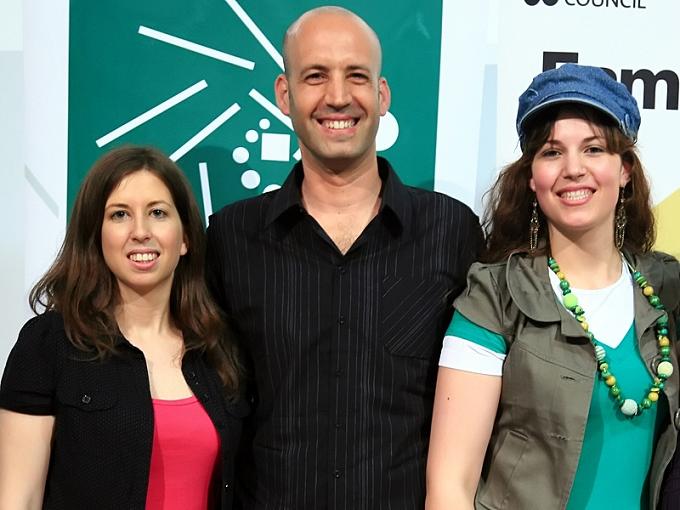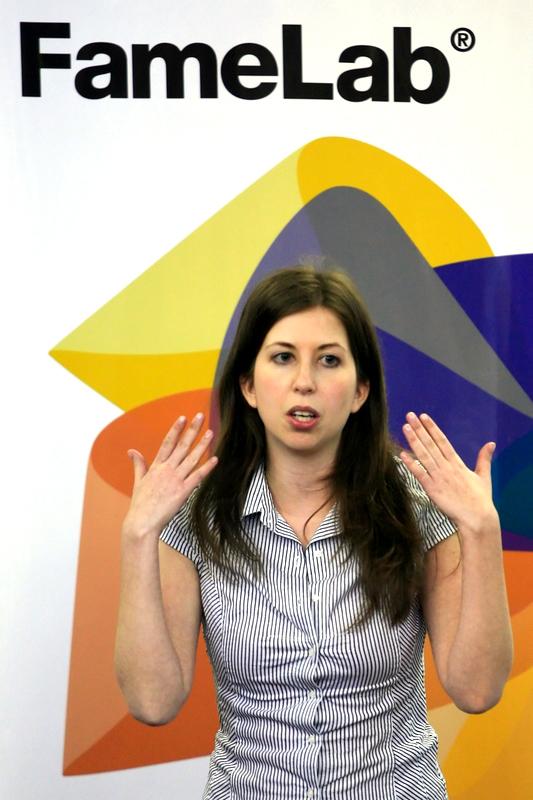Wiedergorn, a doctoral student in clinical neuropsychology at the University of Haifa, explained in three minutes and without technical aids the activity of an area of the brain responsible for the phenomenon of prosopagnosia - difficulty recognizing faces * Ohad Barzilai from Tel Aviv University and Panina First from the Hebrew University were chosen as runners-up

Shani Wiedergorn, a doctoral student in clinical neuropsychology at the University of Haifa, is the winner of the FeyLab competition - science in three minutes - which was held this evening (Monday) at the Hamada Center in Tel Aviv. The conference that started about five years ago in Great Britain, and expanded two years ago to several countries in Eastern Europe and Israel, is organized by the British Council. Wiedergorn won a laptop computer as well as a trip to the Science Festival in Chatham, UK to be held in June. The two elected deputies are Ohad Barzilai from Tel Aviv University and Panina First from the Hebrew University. Barzilai also won the crowd favorite title.
In a conversation with the science website following her win, Wiedergorn said that she intends to continue scientific research, its clinical application and scientific communication. She is actually studying at the same time for a master's degree in clinical psychology and is writing a doctoral thesis on brain research in general and in particular she is researching the retrieval processes of a remote memory - a memory of an item of information that we once acquired. The subject she lectured on, prosopagnosia, does not directly belong to her field of daily practice, but it is a unique impairment from which you can learn about the functioning of the brain.
"Many times you meet someone on the street. He looks familiar to you, but you don't remember who he is. Face recognition is a very important thing for us. The brain has a whole area dedicated to the subject, it processes faces. In some people the area is functioning and there are those for whom this area is not functioning properly due to a car accident, illness or stroke. These people suffer from prosoagnosia - they recognize the face but do not know who it belongs to. The studies show that they nevertheless know somewhere in the brain that this face is familiar to them. This was proven by experiments in which people suffering from the problem were shown photographs that half were familiar to them and half were not, and they were more excited by the photos of their family members.

Barzilai, a PhD student in computer science in Tel Aviv spoke about Google's PageRank mechanism. "Google uses the Page Rank website ranking method. Basically, Google lets the internet rate itself. This ranking is determined by the links, links, that can be found from other websites. Sites that have many links will receive a high score and appear first in the search results.
How is the rating calculated? Every few days Google builds a huge table, approximately - 20 billion columns and 20 billion rows - each web page is represented by a certain row and a certain column. This is the voting table: if from ynet there is a link to the Channel 2 website, we will write the number "1" in the column corresponding to ynet and in the row corresponding to the Channel 2 website. This is equivalent to the fact that ynet sent an SMS to vote for the Channel 2 website in the popularity contest held by Google. Now all that's left is to add up the lines and see who won the most votes? Right? Not exact. "
"Imagine that you are interviewing two candidates for a job, one brings 10 letters of recommendation written by his acquaintances, while the other only brings one letter of recommendation, but one written by Bill Gates. Who will you hire? Of course, a letter of recommendation from Bill Gates is worth more. When the recommender has his own reputation we attach more weight to his recommendation. Now, what if you find out that Bill Gates has distributed 10000 letters of recommendation this year? Would you still value his recommendation as much as before? Probably not, the more easily a person recommends others, the more the relative weight of his recommendations decreases."
"This is exactly how Google's PageRank works. Google discovered an amazing thing - if you run a mathematical operation on the voting table, the matrix, you get a rating of all the websites that appear in the table, so that the rating of each website is affected both by the websites that vote for it and by the rating of those websites. The amazing thing is that Google is actually able to use linear algebra to mathematically define the intuitive terms: relevance and popularity and this whole process is done automatically and without human intervention. And that's what Google does today the best in the world.
Panina First, a master's student in biotechnology at the Hebrew University, with a bachelor's degree in chemistry and biology at a college in Jerusalem, works as an instructor at the Bloomfield Science Museum. The topic of her lecture was "It's not me - it's my bacteria".
During her lecture, she described a study by a researcher from the USA named Prof. Gordon who discovered that the intestine has good bacteria that know how to break down ingredients in food such as dietary fiber. It turns out that the composition of the bacteria is different between fat and thin people. Fat people have bacteria called bacteriodites - which break down the dietary fiber into small units. Thin people have pharmacytes in their stomachs that break down into large units that are more difficult for them to enter and absorb in the body.
In response to the judges' questions, First said that the goal is to create a specific antibiotic that will destroy the fattening bacteria and leave free space for the fattening bacteria to multiply.
The other participants were:
- * Elroei David, a doctoral student in the Faculty of Health Sciences at Ben Gurion University who spoke about the beautiful side of the herpes virus - it turns out that it can be engineered and one of its best features, its ability to kill brain cells, can be used for the benefit of humanity. Through genetic modification, it is allowed to multiply and explode as a result only dividing brain cells. Since brain cells normally do not divide, a dividing brain cell is necessarily a cancer cell. According to him, injecting it into tumors in mice succeeded in causing the tumor to shrink. They are now starting clinical trials in humans, most likely in combination with chemotherapy.
- Ravid Barak - studying for a master's degree in nanotechnology at the Technion told about her field of expertise - a transistor that uses potassium ions instead of electrons. One of the reasons for this is that while our electronic devices speak the language of electrons, the body speaks the language of ions - for example, in a nerve cell, sodium ions enter and potassium ions exit, and this is how it transmits its electrical message. Using the ion resistor it will be possible to diagnose diseases more accurately and quickly.
- Marina Rosenfeld PhD candidate in psychobiology at the Technion - researches the molecular differences between healthy and schizophrenic patients. In her lecture, she decided to talk about the connection between melatonin - that hormone whose level rises in the dark and which allows us to sleep for many hours at night, and cancer, when there is a connection between certain types of cancer and the level of melatonin in the body. She recommends sleeping as many hours as possible at night and not waking up in the middle so as not to wake up the cancer.
- Guy Kriaf, who is studying for a doctorate at the Hadassah Ein-Karem School of Dentistry, tells about the attempt to artificially inject a molecule called P53, which is found in every cell in the body and is supposed to kill it as soon as it becomes cancerous.
- Goren Gordon, who completed a doctorate in chemistry from the Weizmann Institute and is now doing a second doctorate - in neurobiology, told how innovations in nanotechnology bring the vision of the invisibility cloak like that of Harry Potter closer to reality. In nature, it is impossible to find materials with a negative refractive index, but through the production of a nanometer material whose molecules are several nanometers in diameter, this property can be achieved.
- Nega Zvi, a master's student in computer science at the Technion, explained how the encryption algorithms work, when in fact she says that it is a simple but ingenious move because both parties receive the complete key without each knowing which part of the key the other party is responsible for.
The evening was moderated by Eitan Kerin, and the judges were Prof. Elam Gross from the Physics Department at the Weizmann Institute, Prof. Eitan Friedman from the Sheba Medical Center and Tel Aviv University, Dr. Adi Matan, the science attaché of the British Embassy in Israel, and the actress Esti Zakheim, who conducted the workshops to prepare the contestants.
Wiedergorn, the winner of the competition, said about the judges: "The judges were great, they were very professional, they provided the audience with entertainment during the evening and I hope they judged wisely."
Photographs: Black Sivan.

8 תגובות
Sounds really interesting, is it possible to watch next year? Maybe take a photo and upload it to a TED.COM style website?
Unfortunately the competition was not captured on video
Is there a website for the competition in Hebrew?
Was the competition filmed and uploaded somewhere?
Everyone would surely be happy to watch even though they weren't.
It was a great evening, and the competitors managed to keep the entire audience engaged for the duration of the competition. Well done to the competitors, organizers and judges. May there be more and more competitions of this type in the country.
------
my new blog - Another science
Nils, what happened to you?
To the Israelis, what Bulbul thinks is much more important.
Kudos to Shani Wiedergorn and the other participants. Without the Yadan site, I would not have been aware of this event.
Congratulations to the winner! A very interesting competition, it's a shame that in our country it has been relegated to the margins of the news.
Only on scientific websites, and every Zev Tomam, who bought bright green shoes, gets an article on the main page.